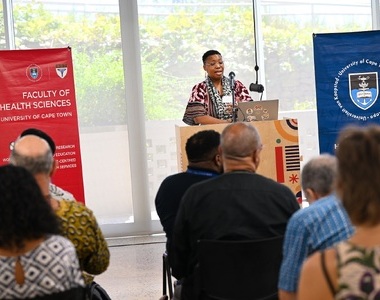UCT book reflects ‘ingenuity, innovation and perseverance’
10 February 2023 | Story Kamva Somdyala. Photos Lerato Maduna. Read time 6 min.
The University of Cape Town (UCT) has launched an open-source book on entrepreneurship titled More than Learning: Entrepreneurship at UCT that has been hailed as the latest addition to Vision 2030’s broad mission.
UCT’s Vice-Chancellor (VC) Professor Mamokgethi Phakeng, speaking at the launch of the book on 1 February at the Hasso Plattner School of Design Thinking (d-school), called the book a timely disruptor to help address the many challenges facing the country.
Students from across multiple disciplines who contributed to the book came together to share their entrepreneurship stories at the event. The book profiles both the people and the ideas shaped by entrepreneurial mindsets, and the VC acknowledged their contributions to UCT and society at large with great delight.
“The book presents three key elements of any entrepreneurship endeavour: the problems to be solved, the people who solve those problems and the solutions they create,” said Professor Phakeng.
“Entrepreneurship at UCT is about the personal stories of individuals within the entrepreneurship ecosystem at UCT; alumni, professional and support staff, students, academics as well the communities we live in, including family, loved ones and wider society.
“Entrepreneurship is not something we do in the classrooms or for ourselves, but a practice that builds value within a community.”
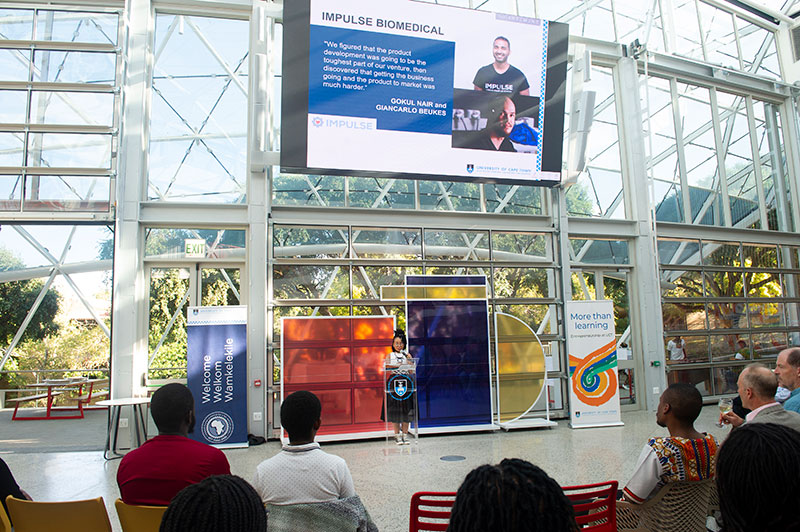
Ingenuity, innovation and perseverance
“The entrepreneurs at UCT are acting upon their belief that the main challenges South Africa faces today can be met with ingenuity, innovation and perseverance,” Phakeng continued, adding that the book comes at a time when the university is firmly focused on Vision 2030 with a massive transformative purpose that says, ‘Unleash human potential to create a fair and just society’.
“Vision 2030 calls on us to disrupt the tired, old ways of doing things.”
“Unleashing human potential is not the work of any individual person, organisation or government. It takes all of us, working to improve our communities and institutions.
“In addition to unleashing human potential, Vision 2030 calls on us to disrupt the tired, old ways of doing things that have lead us to where we are today.”
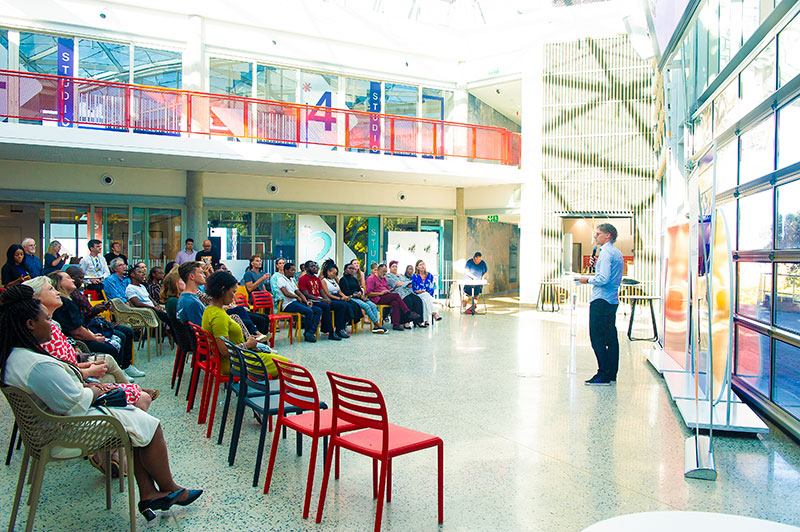
Phakeng said entrepreneurial thinking was the ideal disruptor because it draws on South Africans’ initiative, energy and drive, as well as creativity. “Universities, as public institutions, have a responsibility to serve the public values, aspirations and policies of South Africa.
“Building entrepreneurship is an innovative way to help people connect knowledge and research to the needs of our society and to encourage social awareness and community values and all the elements that go into a successful business enterprise.”
Vibrant entrepreneurship ecosystem
Richard Perez, chairperson of the Entrepreneurship Committee and founding director of the d-school, said the project was a culmination of a vision of wanting to “build and nurture the vibrant entrepreneurship ecosystem that exists at UCT”.
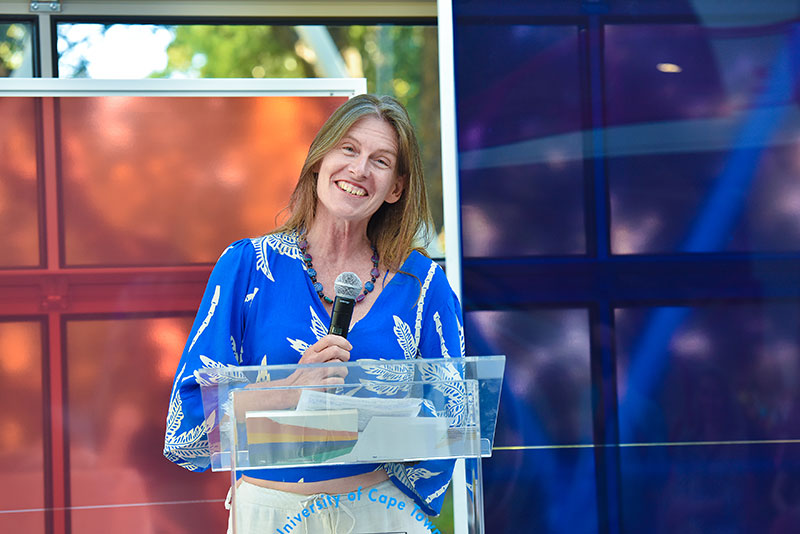
“This is the result of a group of dedicated people at UCT who truly believe in entrepreneurship and the power it has and the role it can play not only at the university, but in the country,” Perez added.
The book project of compiling a collaborative resource detailing narratives from across the spectrum of the UCT entrepreneurship ecosystem was conceptualised and executed by Alison Gwynne-Evans, a senior lecturer in Professional Communication Studies in the Faculty of Engineering & the Built Environment (EBE).
Gwynne-Evans has supported students in their preparation for the national Entrepreneurship Development in Higher Education (EDHE) competition over four years. She set out to capture the range and depth of entrepreneurship support available at UCT and to profile the diversity of stories and motivation of the entrepreneurs behind the variety of entrepreneurial projects that emanated from UCT.
She said “the impetus behind this project was the recognition of the key role of entrepreneurship in addressing social and environmental challenges in South Africa, where entrepreneurs contribute to a national ethos of problem solving. The challenge is for other universities to capture their own stories in a similar process.”
“The book starts by looking critically at the concept of entrepreneurship.”
“The title of the book intentionally links entrepreneurship with learning within a university in a way that opens opportunities in a potentially positive and collaborative manner. The book starts by looking critically at the concept of entrepreneurship,” said Gwynne-Evans.
“The process of writing the book has been an exploration about what drives and inspires individuals at UCT to build and support an ethos where entrepreneurship can flourish.”
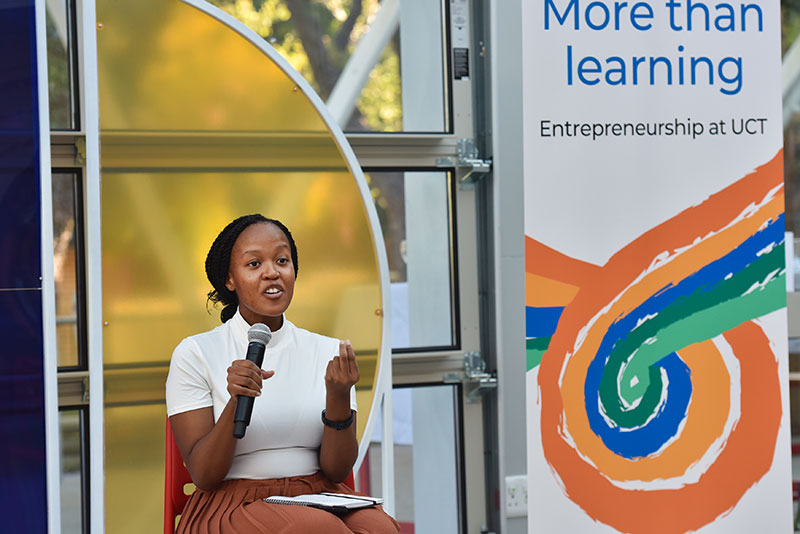
A number of the entrepreneurs in the book contributed to the conversation. Reitumetse Kholumo, owner of Kwela Brews, is a chemical engineer who was taught by her grandmother how to make traditional African beer. Once armed with this knowledge, she set off to find out how she could produce it efficiently.
“I am going to share why I’m an old soul and why Kwela Brews came about,” she said. “The song, Nang' amapolisa ayafika, mama. Ayangena, mama, nge kwela kwela (The police are on their way, they are coming by vans), is a song that is reminiscent of the time children would warn women in the township that police have arrived to raid their homes for their traditional beer.
“As founder of Kwela Brews, I aim to support home brewers of traditional African beer to produce efficiently and profitably by allowing them to reach new markets.”
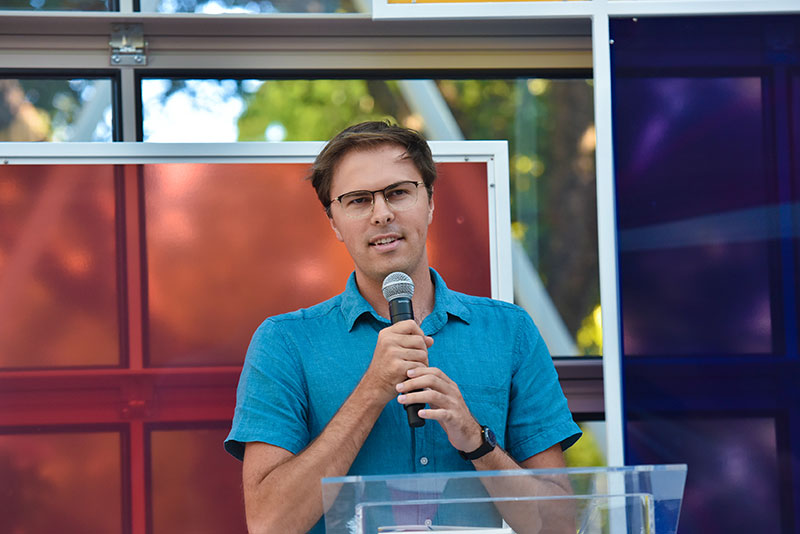
Politically Aweh founder Stephen Horn said the biggest step to starting a business is understanding that you are an entrepreneur and embracing it and bringing people along with you on the journey. “It’s also about empowering others through your work.”
His business is a satirical platform which informs viewers on matters affecting the world. It won a 2022 South African Film and Television Award in the category Best Online Content, and he was named one of the 2022 Mail and Guardian’s Top 200 Young South Africans.
The book is available as an online resource on OpenUCT.
The article was originally published on 7 February 2023.
 This work is licensed under a Creative Commons Attribution-NoDerivatives 4.0 International License.
This work is licensed under a Creative Commons Attribution-NoDerivatives 4.0 International License.
Please view the republishing articles page for more information.







